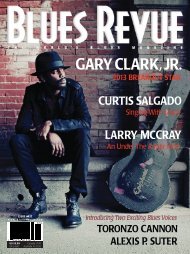GARY CLARK,JR.
GARY CLARK,JR.
GARY CLARK,JR.
You also want an ePaper? Increase the reach of your titles
YUMPU automatically turns print PDFs into web optimized ePapers that Google loves.
Reviews<br />
On this record, the candle light aura of pre-war<br />
blues mixes perfectly with the electric lightnin’<br />
of today’s musical directions.<br />
BEN HARPER & CHARLIE MUSSELWHITE<br />
Get Up<br />
Stax<br />
They’ve toured together off and on for years. When Ben Harper has<br />
needed a harmonica player to augment his vision, he usually summons<br />
one of the best, Charlie Musselwhite. From their first days in<br />
the studio backing John Lee Hooker in 1998 on Best Of Friends,<br />
these two visionaries have explored the possibilities of their music.<br />
Now with this recording and subsequent touring, fans of each can<br />
hear that magic as these soulful brothers from vastly different generations<br />
connect. We all know Musselwhite’s roots, but for those<br />
unfamiliar with Harper’s background should know that he grew up<br />
in his grandparents’ music store playing everything with strings and<br />
meeting the likes of Taj Mahal and David Lindley. His early heroes<br />
were the Delta pre-war guitarists like Hurt and Johnson. His first<br />
tour was opening for Taj.<br />
The ten songs were written or co-written by Harper and offer a<br />
diverse mixture of styles with the ghosts of traditional blues floating<br />
throughout the outing. The opener, “Don’t Look Twice,” starts off<br />
acoustically with musical hints of a dusty 1930’s 78 by Skip James.<br />
By mid-song, the full band explodes on the chorus around Musselwhite’s<br />
seasoned reed work. Harper’s falsetto, James-like vocals,<br />
and Musselwhite’s Chicago harmonica instantly connect all things<br />
blues – Delta to Chicago. Harper and Musselwhite close the CD in<br />
similar blues tradition fashion. “All That Matters Now” features<br />
acoustic harmonica, piano, and Harper’s late night vocals in this<br />
new millennium answer to Leroy Carr’s “How Long Blues.” In<br />
Carr’s song, and Johnson’s musical mirror “Love In Vain,” the tone<br />
was longing; here, Harper offers a refreshing meditation on life,<br />
satisfied to live in the moment of companionship.<br />
BUDDY GUY<br />
Live At Legends<br />
Silvertone<br />
Buddy Guy’s first live album, 1968’s This Is<br />
Buddy Guy! (Vanguard), broadened his<br />
reputation among blues fans as well as<br />
rock fans at the time (e.g., I attended a concert<br />
at the Spectrum in Philadelphia in July,<br />
1969 in which Buddy Guy was on the bill<br />
with the Al Kooper Big Band, Led Zeppelin,<br />
Jethro Tull, and Johnny Winter). These<br />
electrifying last recordings from his January<br />
2010 residency at the old Legends had the<br />
same effect on me as his aforementioned<br />
Vanguard album with its intensity, energy,<br />
and swagger.<br />
Guitarist Rick Hall, bassist Orlando<br />
Wright, keyboardist Marty Sammon, and<br />
drummer Tim Austin provide sharp, muscular<br />
support for Guy’s soul-on-fire vocals<br />
In between, these<br />
musical visionaries set the<br />
artistic bar high. There are<br />
high-energy tunes. “I’m In<br />
I’m Out I’m Gone” stomps<br />
‘50’s classic Chicago blues<br />
with a musical undertone of<br />
“Mannish Boy.” Here, Musselwhite’s<br />
retro harp recalls<br />
the greats of that era.<br />
“Blood Side Out” features<br />
Harper’s primal lungpower<br />
blasting his modern message, and “I Don’t Believe A Word You Say”<br />
bulldozes its heavy metal message in a way that would make Page,<br />
Plant, Jones, and Bonham smile.<br />
At the same time, Harper and Musselwhite understand musical<br />
dynamics. With only a stripped down acoustic guitar and harmonica,<br />
“You Found Another Lover (I Lost Another Friend)” floats delicately like<br />
a hummingbird. Their decades of work with the Blind Boys of Alabama<br />
comes through on the handclappin’, gospel-like “We Can’t End This<br />
Way,” where Harper’s expressive slide mimics his vocal enthusiasm.<br />
Harper’s “I Ride At Dawn” is a haunting tale of every soldier’s<br />
wartime experiences. Harper’s written the compelling letter every<br />
soldier sends whether preparing for a Civil War charge or Iraqi village<br />
search. Taken as a whole, it’s a haunting and devastating<br />
humanization of war’s individual toll.<br />
These ten songs are the culmination of musical experiences<br />
these soul mates have explored, and they forecast new directions of<br />
the blues. There is also a deluxe edition available which includes a<br />
DVD of in-studio performances of four songs and 25 minutes of<br />
Harper and Musselwhite discussing their history.<br />
– Art Tipaldi<br />
and incendiary solos. Listeners are immediately<br />
in Guy’s grip after the first flurry of<br />
slicing, side-piercing notes on the self-deprecating<br />
catharsis “Best Damn Fool.” A<br />
dual homage to Muddy Waters follows with<br />
a searing “Mannish Boy” and then a furiously<br />
funky “I Just Want to Make Love to<br />
You,” the album’s longest track at 9:22 slyly<br />
segues into Bobby Rush’s signature chunkof-funk<br />
“Chickenheads.” The heartfelt ballad<br />
of tolerance “Skin Deep” slows things<br />
BLUES REVUE 39



